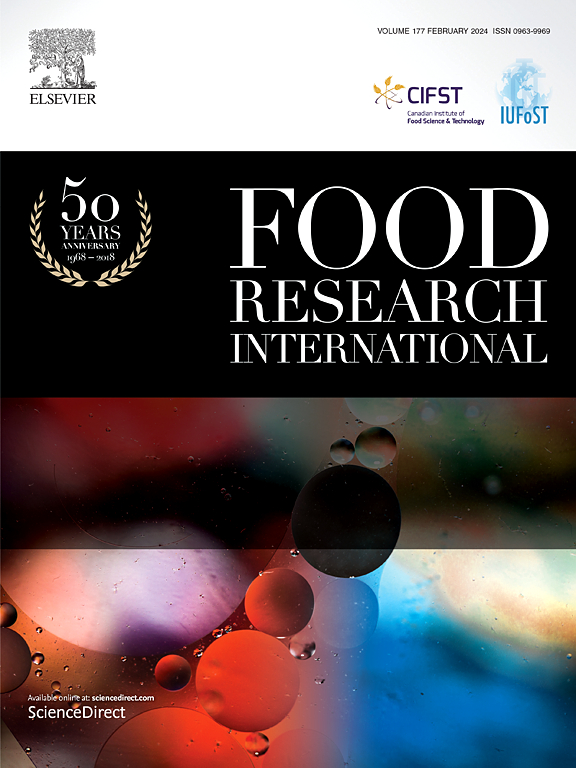茶多酚:预防草鱼细菌性肠炎的一种有前景的抗生素替代品
IF 7
1区 农林科学
Q1 FOOD SCIENCE & TECHNOLOGY
引用次数: 0
摘要
在水产养殖中广泛使用抗生素来控制草鱼(Ctenopharyngodon idella)的细菌性肠炎,引起了对药物残留、细菌耐药性和环境污染的关注。面对水产养殖中抗生素耐药性的挑战,本研究探索了茶多酚作为预防嗜水气单胞菌引起的草鱼细菌性肠炎的有前景的替代品。我们研究了茶多酚(40、80、120、160和200 mg/kg,持续60天)对嗜水单胞杆菌氧化应激、炎症和细胞凋亡的影响。结果显示,服用120 mg/kg茶多酚组的肠炎发病率最低(8.50%),与对照组(18.44%)相比显著降低。0.05)。此外,茶多酚可增强抗氧化酶活性,下调促炎基因表达(P <;0.05),表明它们有可能通过调节Nrf2/Keap1和JAKs/STAT3通路以及细胞凋亡来替代抗生素。嗜水单胞杆菌感染是草鱼养殖的主要威胁,每年造成的重大经济损失估计为1.64亿美元。我们的研究结果表明,茶多酚在120 mg/kg的最佳浓度下,可以作为一种有前景的、环境可持续的抗生素替代品,用于预防草鱼的细菌性肠炎,有可能减少对抗生素的依赖,并最大限度地降低抗生素耐药性和药物残留的风险。与传统抗生素治疗相比,有必要进行进一步研究,以评估商业水产养殖环境中茶多酚的长期疗效和成本效益。本文章由计算机程序翻译,如有差异,请以英文原文为准。

Tea polyphenols: A promising alternative to antibiotics for preventing bacterial enteritis in grass carp (Ctenopharyngodon idella)
The widespread use of antibiotics in aquaculture to control bacterial enteritis in grass carp (Ctenopharyngodon idella) has raised concerns about drug residues, bacterial resistance, and environmental contamination. Facing the challenges of antibiotic resistance in aquaculture, this study explored tea polyphenols as a promising alternative for preventing Aeromonas hydrophila-induced bacterial enteritis in grass carp. We investigated the effects of dietary tea polyphenols (40, 80, 120, 160, and 200 mg/kg for 60 days) on oxidative stress, inflammation, and apoptosis following a 6-day A. hydrophila challenge. The results revealed that the group receiving 120 mg/kg of tea polyphenols showed the lowest incidence of enteritis (8.50 %), a significant reduction compared to the control group (18.44 %, P < 0.05). Furthermore, tea polyphenols enhanced antioxidant enzyme activity and downregulated pro-inflammatory gene expression (P < 0.05), suggesting their potential to replace antibiotics by modulating the Nrf2/Keap1 and JAKs/STAT3 pathways, as well as apoptosis. A. hydrophila infections are a major threat to grass carp aquaculture, causing significant economic losses estimated at $164 million per year. Our findings suggest that tea polyphenols, at an optimal concentration of 120 mg/kg, can serve as a promising and environmentally sustainable alternative to antibiotics for preventing bacterial enteritis in grass carp, potentially reducing reliance on antibiotics and minimizing the risk of antibiotic resistance and drug residues. Further research is warranted to evaluate the long-term efficacy and cost-effectiveness of tea polyphenols in commercial aquaculture settings compared to traditional antibiotic treatments.
求助全文
通过发布文献求助,成功后即可免费获取论文全文。
去求助
来源期刊

Food Research International
工程技术-食品科技
CiteScore
12.50
自引率
7.40%
发文量
1183
审稿时长
79 days
期刊介绍:
Food Research International serves as a rapid dissemination platform for significant and impactful research in food science, technology, engineering, and nutrition. The journal focuses on publishing novel, high-quality, and high-impact review papers, original research papers, and letters to the editors across various disciplines in the science and technology of food. Additionally, it follows a policy of publishing special issues on topical and emergent subjects in food research or related areas. Selected, peer-reviewed papers from scientific meetings, workshops, and conferences on the science, technology, and engineering of foods are also featured in special issues.
 求助内容:
求助内容: 应助结果提醒方式:
应助结果提醒方式:


